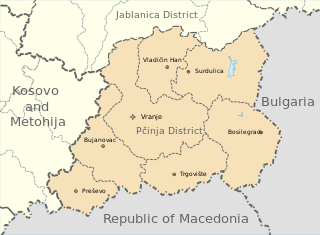| Pčinja District | |
|---|---|
| District of Serbia | |
                 Images from the Pčinja District
Images from the Pčinja District | |
 Location of the Pčinja District within Serbia Location of the Pčinja District within Serbia | |
| Coordinates: 42°33′N 21°54′E / 42.550°N 21.900°E / 42.550; 21.900 | |
| Country | |
| Region | Southern and Eastern Serbia |
| Administrative center | Vranje |
| Government | |
| • Commissioner | Srećko Pejković |
| Area | |
| • Total | 3,520 km (1,360 sq mi) |
| Population | |
| • Total | 193,802 |
| • Density | 55/km (140/sq mi) |
| ISO 3166 code | RS-24 |
| Municipalities | 6 and 1 city |
| Settlements | 363 |
| – Cities and towns | 6 |
| – Villages | 357 |
| Website | www |
The Pčinja District (Serbian: Пчињски округ, romanized: Pčinjski okrug, pronounced [ptʃǐɲskiː ôkruːɡ]) is one of the nine administrative districts of Southern and Eastern Serbia. It covers the southern part of Serbia, bordering Kosovo, along with Bulgaria and North Macedonia. Its administrative center is the city of Vranje.
As of the 2022 census, the district has a population of 193,802 inhabitants.
The Vranjska Banja spa plays a part in this region with its multi-medicinal thermal mineral waters.
Municipalities
The district encompasses the municipalities of:

Culture and history
The ancient Paeonian tribe of the Agrianians ruled the region in antiquity.
Cultural and historical monuments date back from over five centuries ago. The earliest military fortification, Marko's Fortress, was established in the 13th century. Also famous are the ancient Turkish public baths from the 16th century and the Pasha's House from 1765, in which a grammar school was opened in 1882.
In 2001, uprisings by Albanians occurred in the Albanian-majority municipalities of Preševo and Bujanovac. In addition, reports emerged in 2006 that the municipality of Trgovište had threatened to secede itself to North Macedonia, which was noteworthy, since it had (and still has) a majority Serb population. Representatives cited economic hardship and a declining population as grievances against Serbia’s government.
Demographics
| Year | Pop. | ±% |
|---|---|---|
| 1948 | 209,232 | — |
| 1953 | 220,910 | +5.6% |
| 1961 | 222,520 | +0.7% |
| 1971 | 230,373 | +3.5% |
| 1981 | 238,753 | +3.6% |
| 1991 | 243,529 | +2.0% |
| 2002 | 227,690 | −6.5% |
| 2011 | 159,081 | −30.1% |
| 2021 | 193,802 | +21.8% |
| Source: | ||
As of the 2022 census, the district has a population of 193,802 inhabitants.
Ethnic composition
| Ethnic group | Population 1991 |
Population 2002 |
Population 2011 |
Census 2022 | |
|---|---|---|---|---|---|
| Population | % | ||||
| Serbs | - | 147,046 | 132,601 | 112,011 | 57.8 |
| Albanians | - | 54,795 | 680 | 56,834 | 29.3 |
| Romani | - | 12,073 | 13,826 | 10,877 | 5.61 |
| Bulgarians | - | 8,491 | 7,287 | 4,970 | 2.56 |
| Others | - | 5,285 | 4,687 | 9,110 | 4.70 |
| Total | 243,529 | 227,690 | 159,081 | 193,802 | 100 |
Religion
Based on the census results from 2022, the Pčinja District has a Christian Orthodox majority (60.4%) and a substantial Muslim minority (31%).
| Religious group | Census 2002 | Census 2022 | ||
|---|---|---|---|---|
| Population | % | Population | % | |
| Orthodoxy | 157,635 | 69.2 | 117,016 | 60.4 |
| Islam | 56,334 | 24.7 | 60,032 | 31.0 |
| Other Christians | 268 | 0.12 | 3,915 | 2.02 |
| Others | 1,430 | 0.63 | 759 | 0.39 |
| Did not declare | 8,352 | 3.67 | 2,594 | 1.34 |
| Unknown | 3,495 | 1.53 | 9,486 | 4.89 |
| Total | 227,690 | 193,802 | ||
See also
Notes
| a. | In the municipalities of Bujanovac and Preševo (parts of Pčinja District) there was undercoverage of the census units, owing to the boycott by most of the members of the Albanian ethnic community. |
References
- ^ "Prvi rezultati Popisa stanovništva, domaćinstava i stanova 2022". stat.gov.rs (in Serbian). 21 December 2022. Retrieved 16 February 2023.
d
- "Lost in Shuffle, Serb Town Sees Future in Macedonia." New York Times, April 25, 2006.
- "2011 Census of Population, Households and Dwellings in the Republic of Serbia" (PDF). stat.gov.rs. Statistical Office of the Republic of Serbia. Retrieved 11 January 2017.
- "Претрага дисеминационе базе". data.stat.gov.rs. Retrieved 2023-06-21.
- Note: All official material made by the Government of Serbia is public by law. Information was taken from the official website.
External links
| Places adjacent to Pčinja District | ||||||||||||||||
|---|---|---|---|---|---|---|---|---|---|---|---|---|---|---|---|---|
| ||||||||||||||||
| Districts of Serbia | |
|---|---|
| Vojvodina | |
| Belgrade | |
| Šumadija and Western Serbia | |
| Southern and Eastern Serbia | |
| Kosovo and Metohija | |
| |